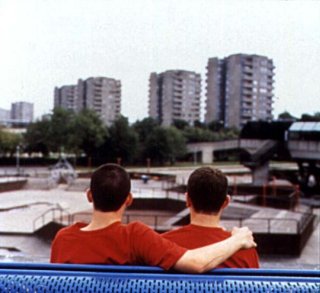gay teen love uses Rodgers and

Hammerstein's "Sixteen Going on
Seventeen" and the Mama Cass hit
"Make Your Own Kind of Music" as the
background music for kissing scenes
between a couple of teenage boys.
Beautiful Thing is the story of two teenage boys who fall in
love and start to come to terms
with their sexuality in a world which finds it hard to understand
them.
Jonathan Harvey's screenplay (based on his stageplay which I
also directed) is proud and very
funny. His writing has great charm and poignancy but it is never
sentimental. It is a story about
the power of love and is rooted in a belief in the human spirit.
I think this optimism is central to
the film, and it is wonderful to have the opportunity to show
what a beautiful thing the love
between two people can be no matter what sex they are.
I hope the film will help bring encouragement and affirmation
to many young people who are
going through the same experience as the two boys. I hope it will
bring understanding and
support for them from their friends and families. I hope it will
make everyone who sees it feel
that the things they want in life are possible.
This tenderly ironic British celebration of
gay teen love uses Rodgers and
Hammerstein's "Sixteen Going on
Seventeen" and the Mama Cass hit
"Make Your Own Kind of Music" as the
background music for kissing scenes
between a couple of teenage boys.
It's all done in the innocent style of an
after-school special - albeit the kind of
after-school special that only British
television could sponsor, complete with
four-letter words and parental figures
who can be vulgar, criminally abusive and
style-challenged in their dressing habits.
Indeed, adolescent Ste (Scott Neal) is so
tormented by his drunken father that he's
invited to stay with Jamie (Glen Berry),
the teenage son of Sandra (Linda Henry),
a single mother who works at a pub near
the public-housing project they all live in.
The boys end up sharing the same bed
and, though they appear to be opposites,
they can't deny their attraction to each
other.
A talented athlete, Ste is worried about
being labeled gay, and he has a couple
of moments of homosexual panic. "He's in
love," Jamie mischievously explains when
Linda wonders why Ste is suddenly giving
him the chilly treatment. Linda thinks he's
referring to a new girlfriend. Jamie hates
sports, he knows enough about
Broadway musicals to tell you who
played the baroness in the movie of The
Sound of Music and he's already on the
verge of coming out. He swipes an issue
of Gay Times from a newsstand,
discovers a bar they can visit and takes
Ste on their first date.
Meanwhile, Sandra is in the midst of a
bumpy romance with a hippie painter
named Tony (Ben Daniels), who spends
a lot of on-screen time wearing a
woman's silk dressing gown. Another
neighbor, the flamboyant Leah (Tameka
Empson), who suspects that Jamie and
Ste have become lovers, further
complicates matters by spreading the
news.
Nevertheless, all ends in a fairy-tale
coming-out finale that could have been
inspired by Mike Leigh's Secrets & Lies,
in which the closet doors are opened and
there's same-sex dancing in the streets.
You may not buy the idea that Ste is no
longer in danger from his horrendous
father, or that Jamie's mother could so
easily adjust to his declaration of sexual
orientation (she believes gays can always
retreat to "a Mediterranean island called
Lesbian"), but the ending is every bit as
liberating as it's meant to be.
Beautiful Thing isn't particularly deep,
nor is it a great piece of filmmaking, but
it's so sweet-natured and well-acted that
it's hard to resist. Berry and Neal play
their love scenes with an intimacy that
makes their feelings for each other seem
the most natural thing in their unhappy
universe. Henry makes Sandra, the most
fleshed-out character, quite
three-dimensional in her longing for a
better job and a more rewarding life for
her much-bullied son.
Jonathan Harvey, who based the script
on his long-running play, has a sneaky
sense of humor that keeps the material
from becoming preachy and
self-conscious. And director Hettie
Macdonald, who handled the London
stage productions, knows the characters
so well that she can't seem to make a
false move.
© copyright 1996 Film.Com